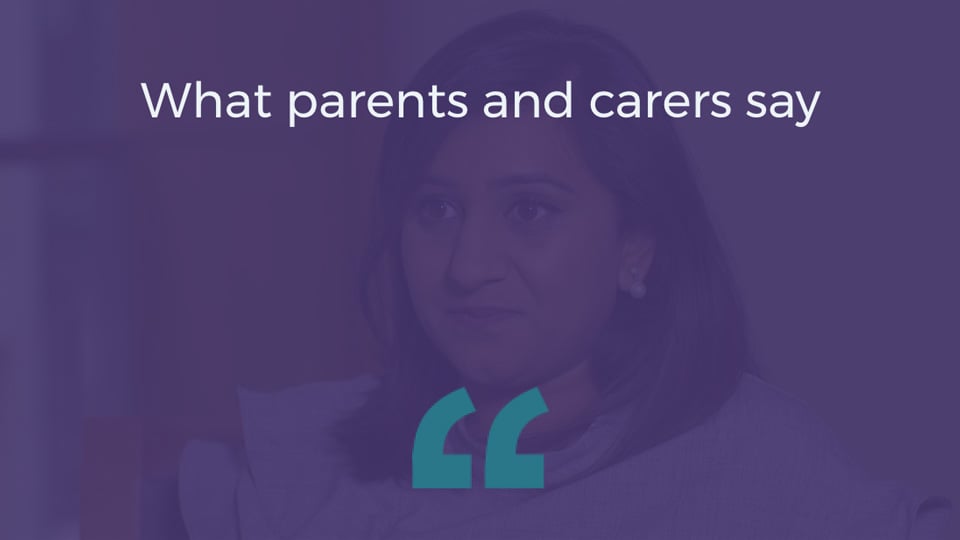Newsletter Sign Up
Regular work+family updates for
HR and diversity professionals.
My Family Care interviewed Adrienne Burgess, Joint Chief Executive and Head of Research at the Fatherhood Institute, as part of our Thought Leaders interview series. Here are Adrienne's very compelling arguments for actively supporting fathers at work.
Assortative mating
Let me start by throwing the term "assortative mating" at you. It just means that when it comes to finding a partner we naturally seek out a person with similar characteristics to ourselves, in terms of looks, education, intelligence and so on.
As women have found greater opportunities to rise up the career ladder, the men already there have been finding their partners from among these women - not, as in previous generations, from among women less educated and qualified than themselves.
Top of the list of how we meet our life partners is still 'in the workplace' and the rise of online dating has made it even easier to find partners similar to ourselves. More and more couples with equally fulfilling and financially rewarding careers are now having to meet the challenge of negotiating two careers through the ups and downs of the parenthood life-stage.
What goes around comes around
When I was engaging as a consultant with Australian bank Westpac in 2002, they were introducing substantial parental leave for fathers as well as mothers, right across the company.
I said to HR chief, Rilla Moore: "How do you justify doing that internally?"
"Well" she said, "we really want to hang on to our talent, both the women and the men. Men are undoubtedly becoming more engaged and actively involved in parenting, so things are changing and we need to change to recognise that. However, the women still carry the greatest load in the 'new family' stage. For every Westpac dad who's working flexibly or taking on more responsibility for sharing the domestic load in whatever way, there's a less stressed, less distracted, more productive working mother out there. She might not work for Westpac, but we believe what goes around will ultimately come around!"
We all understand that the social, cultural, legal, demographic and economic drivers that are changing our collective attitudes to how and why we work are not going to go away. Westpac, ambitious to be an 'employer of choice', lead the way and gained advantages over and above the functional benefits of helping working fathers.
Being seen to support dads sends a great message to women as well. Being ahead of the curve has done great things for their employer brand, in terms of being seen as innovative and farsighted.
Let's come back to 'assortative mating' for a moment. Industry sectors like banking and law are discrete and relatively small in terms of the number of companies in them. There are more women coming into these sectors than ever before, many of them choosing other bankers (or lawyers) as partners and, over time, potentially moving to another bank (or law firm). Westpac's view was that if other Australian banks actively support their working fathers (and more now do), it's good for the sector overall, and for Westpac's own productivity.
So what do dads want?
Now let's focus on the needs and wants of working fathers. It's really clear, through my experience and published research, that men of childrearing ages want a very different relationship with their children than the ones they had with their own fathers. They want to be at antenatal classes and actively involved from birth onwards. They have very different expectations from previous generations (as do their partners!).
I've lost count of the number of conversations I've had with 30-40 year old men who just don't understand why their employer 'doesn't get it' when for themselves and their peers, it's crystal clear.
For employers there's an important lesson here
Credible research including the British Social Attitudes Survey (NatCen 2012) and a substantial Australian survey (Russell et al, 1999) shows 1:4 employed men leaving their employers because their work is incompatible with their caring responsibilities. But unlike women, whose issues and reasons for leaving are very visible, the men are much less likely to disclose.
Irrespective of the impact that supporting dads has on working mothers, employers should be looking after dads purely to retain them as talent in their own right.
How do you do it?
Let's look at a few examples. I was recently involved in a coaching programme for over 700 bankers in Europe, Hong Kong, Singapore and Australia. The focus of the sessions was 'Raising clever children: the difference a dad makes'. These were all very clued up, very high powered and highly successful bankers. By finding an angle that really engaged and appealed to them; the bank was able to take what had previously been quite hidden issues and angst about work and being a good father and open it all up.
The topic provoked intense conversations, fathers raised their hands and became vocal about what they do as dads, why they do it, and how they 'work smart' to keep their careers on track - and good relationships with their children. The programme was a big part of a cultural shift and normalised water-cooler conversations about the men's twin roles as dads and workers.
In a completely different world, I worked with a small manufacturer that had never given any thought to working dads. After a few conversations with a very open boss and a good HR team, they picked up the ball and ran with it. To start with they asked their male employees about their parenting responsibilities. One separated father looked after his children at weekends. This was fine, but the company was only offering incentives for overtime worked at weekends. He simply couldn't do this. But what he could do was work longer hours during the week when his children were with their mother. Incentives were then offered for extra evening shifts, too. This worked for both him and the company. Everyone benefitted and the halo effect of just asking the questions was enormous. It's a small example, but one that illustrates again the hidden nature of what you can be dealing with.
Let's come back to couples, the family unit and what employers need to know
I hope what you're thinking about now is that, from an employer's perspective, it's no longer possible to look at working mothers and fathers separately: you have to consider the whole family unit.
New parenthood is a particular shock for very young parents and for those (with more experience and therefore value to employers) who are now coming to parenthood later in life. Two-thirds of UK babies are born to fathers over 30 and the better educated and qualified men and women are, the later they come to parenthood.
These parents, with greater expectations and with greater pressures on them, need more support. But why is this an issue for an employer, over and above the loss of talent and experience if a highly valued father moves on?
Well, when things go wrong (and 40% of children will see their parents separate before the age of 16), the fall-out, the stress and depression from separation costs business.
Both men and women who are unhappy at home lose focus and develop health and mental health problems, and there's clear evidence that when men in particular are distressed their work performance suffers. Men don't have personal networks 'on tap' as women so often do, where they can unburden and gain support. They're also less likely to seek support (from employee assistance programmes, for instance). They're also more likely than women to be in the process of losing contact their children and suffering from the loss. When their fatherhood is visible at work, opportunities to both seek and be offered support are greater.
And so in conclusion
Think about it this way: once upon a time supporting women, through maternity coaching programmes and other policies, was ground-breaking; now it's pretty commonplace.
Acting now to understand and address the needs of the fathers in your organisation (and it needn't be expensive) could save you a whole host of issues and talent-drain. And there's a lot of employer brand currency to be had as an innovator rather than a laggard.
Oh and by the way, just back to our friends at Westpac: 43% of their employees (36% of men and 48% of women) now work flexibly; and women comprise 61% of their workforce. Apart from being highly profitable and paying excellent dividends, Westpac has been named as one of world's most ethical companies by Ethisphere from 2008 to 2012. The company is ranked 10th in the Global 100 list of the world's most sustainable corporations, as announced at the 2013 World Economic Forum. There it was the highest placed bank globally and the highest placed Australian company. Westpac has featured in the Global 100 for seven of the last eight years.
Adrienne Burgess, The Fatherhood Institute












